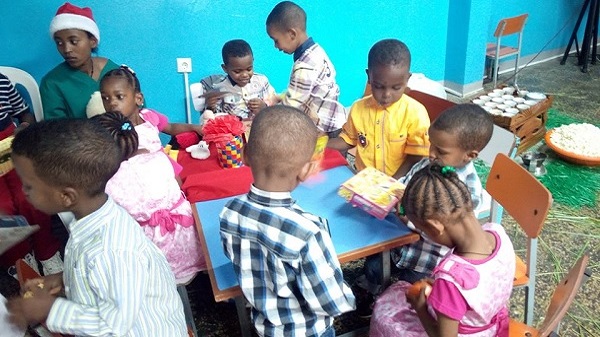
Eyasu is one of the nurses at Sele Enat, an indigenous orphanage which currently hosts some 70 orphans. Some of them are healthy, others are HIV positive, and few of them are disabled.
By Seleshi Tessema (Anadolu Agency)
ADDIS ABABA―Nebyu Sele Enat and his friend Halwet Sele Enat are barely one-and-a-half-years-old, bright-eyed smiling kids competing for the warmth of their caregiver, Meraf Eyasu.
Eyasu, 29, has nurtured many children under the roofs of Sele Enat, a walled old building filled with stories both disheartening and encouraging. It is located in the southern part of the Ethiopian capital, Addis Ababa.
A year or so ago, when light appeared over the skies of the capital, Nebyu and Halwet woke up crying to their fates near a church and a garbage site, on different days. They were taken to nearby police stations by early morning churchgoers and people on their daily routines.
The duty officers who registered the abandoned kids named them Nebyu and Halwet.
Their second name, Sele Enat, is not the name of a biological father. It is a name given to an institution, an orphanage, which has been taking care of children who have lost one or both of their biological parents to AIDS or other diseases, or been abandoned by their parents due to various reasons.
Eyasu is one of the nurses at Sele Enat, an indigenous orphanage which currently hosts some 70 orphans. Some of them are healthy, others are HIV positive, and few of them are disabled.
Vulnerable population
According to UNICEF, Ethiopia, the second-most populous nation in Africa with about 102 million people, has one of the largest orphan populations in the world. Nearly 13 percent of the children live without one or both parents.
“There are an estimated 4.5 million orphans … of which approximately 800,000 have lost their parents to AIDS,’’ according to UNICEF, estimating that the number of AIDS orphans is some 2.5 million.
Official figures put the number of HIV-positive children under age 15 to be some 160,000.
Achamyeleh Alebachew, a senior expert with Ethiopia’s Federal HIV/AIDS Prevention and Control Office (FHAPCO), told Anadolu Agency that Ethiopia is one the nations hardest hit by the HIV/AIDS epidemic, which has wiped out families and forced communities to devote most of their productive time to taking care of patients and orphaned children.
“Over the past two decades or so, we have built freely accessible HIV/AIDS treatment centers in all hospitals and clinics throughout the country,” he said.
Read the complete story at Anadolu Agency
